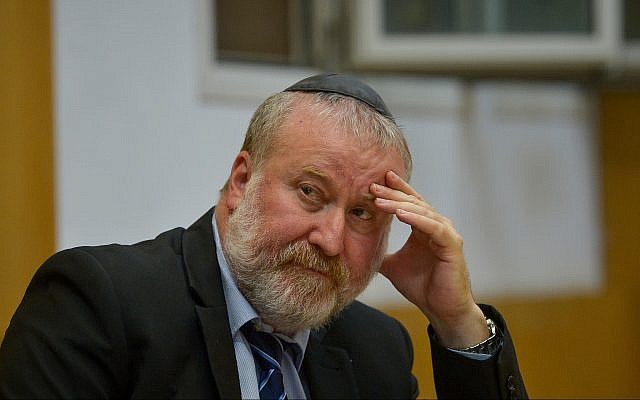Legislation ‘offers zero benefit and exacts maximum damage,’ warns Gideon Sa’ar, drawing rebuke from Likud officials

An influential Likud lawmaker, who has butted heads with Prime Minister Benjamin Netanyahu in the past, on Thursday slammed the party’s plan to pass a special law that would grant the premier immunity from prosecution while in office.
“This legislation offers zero benefit and causes maximum damage,” warned MK Gideon Sa’ar in an interview with Channel 12 news, amid reports that the prime minister has been advancing just such a bill and briefing Likud’s lawmakers on how to sell it to the public.
Netanyahu faces indictment in the coming months, pending a hearing before Attorney General Avichai Mandelblit, in three corruption investigations.
While Sa’ar wouldn’t commit to how he would vote on such an immunity bill, he noted that “we told the public [during the recent election campaign] that we weren’t going to do this. I think a law like this will hurt Likud and won’t help the prime minister.”
Sa’ar added that he “isn’t the only one who’s concerned” within Likud’s top ranks.

Netanyahu said on March 24, at the height of the election campaign, that an immunity law was “out of the question,” and insisted he had buried previous initiatives by right-wing MKs to advance such a bill.
Netanyahu may not need new legislation to try to protect himself, a fact that Sa’ar noted during several times during his interview. According to the existing law, Knesset members can be granted immunity if a majority of lawmakers are convinced the defendant has been treated unfairly and the charges are based on discrimination or were filed in bad faith.
“The Knesset can give him immunity if it is persuaded that he is the victim of a vendetta — as [Netanyahu] believes is the case,” legal scholar Mordechai Kremnitzer told The Times of Israel late last year.
Nonetheless, were the Knesset to grant Netanyahu immunity from prosecution, the move would doubtless lead to petitions to Israel’s Supreme Court. Netanyahu has also been reportedly considering legislation to limit the court’s powers to intervene in such matters.
Despite blasting the immunity law on Thursday, Sa’ar defended Netanyahu’s right to serve as prime minister while under indictment.
Israeli law allows a prime minister to remain in office until he or she is convicted by a court of a crime classified as bearing moral turpitude, and only when all appeals have been exhausted.

“There’s no question the law says explicitly that he can serve,” Sa’ar said, pointing out that voters want him to despite the looming indictment, as evidenced by the results of the April 9 elections.
“The public, which knew about the suspicions and voted [for Netanyahu] even when it knew the suspicions, so I don’t think there’s anything there that prevents the prime minister from continuing to serve,” he said. “I think [the voters’] democratic choice carries a lot of weight in this situation.”
Sa’ar immediately drew vociferous — though anonymous — rebuke from sources in the Likud party.
“Sa’ar is being sanctimonious, and again working to undermine Netanyahu,” one source was quoted as saying by Channel 12 after the interview aired.

“It’s no accident the leftist media can’t stop embracing Gideon Sa’ar, because he doesn’t miss any opportunity to undermine Netanyahu and try to topple him,” another Likud official said.
Netanyahu has long clashed with popular Likud politicians he perceived as potential future rivals. The list is long and includes several activists and lawmakers who would eventually leave Likud’s ranks and go on to lead other right-wing parties that would sit in his coalition, including Jewish Home, Kulanu and Yisrael Beytenu.
One of the premier’s longest running and public spats is with Sa’ar, a former Likud No. 2, whose primary run for the Likud Knesset slate ahead of the April elections Netanyahu actively and openly tried to stymie.
On Wednesday, Channel 12 reported that Netanyahu had ended weeks of “indecision” and committed to passing legislation to ensure he could not be prosecuted while in office.
Mandelblit announced in February his intention to indict Netanyahu, pending a hearing, on charges of fraud and breach of trust in three cases, and bribery in one of them.

The prime minister denies the allegations and has insisted the investigations are part of efforts by the media and the Israeli left to remove him from power, with the support of a dishonest police investigating team overseen by a “weak” attorney general.
In Case 1000, Netanyahu is accused of receiving gifts and benefits from billionaire benefactors, including Israeli-born Hollywood producer Arnon Milchan, in exchange for favors. Mandelblit said he intends to charge Netanyahu with fraud and breach of trust in that case.
In Case 2000, involving accusations Netanyahu agreed with Yedioth Ahronoth newspaper publisher Arnon Mozes to weaken a rival daily in return for more favorable coverage from Yedioth. Mandelblit will seek to also charge the premier with fraud and breach of trust, while Mozes will be charged with bribery, in that case.
In Case 4000, widely seen as the most serious against the premier, Netanyahu is accused of having advanced regulatory decisions that benefited Shaul Elovitch, the controlling shareholder in the Bezeq telecom giant, to the tune of hundreds of millions of dollars, in exchange for positive coverage from the Elovitch-owned Walla news site. In that case, Mandelblit announced he intends to charge both Netanyahu and Elovitch with bribery.
As reported by The Times of Israel
